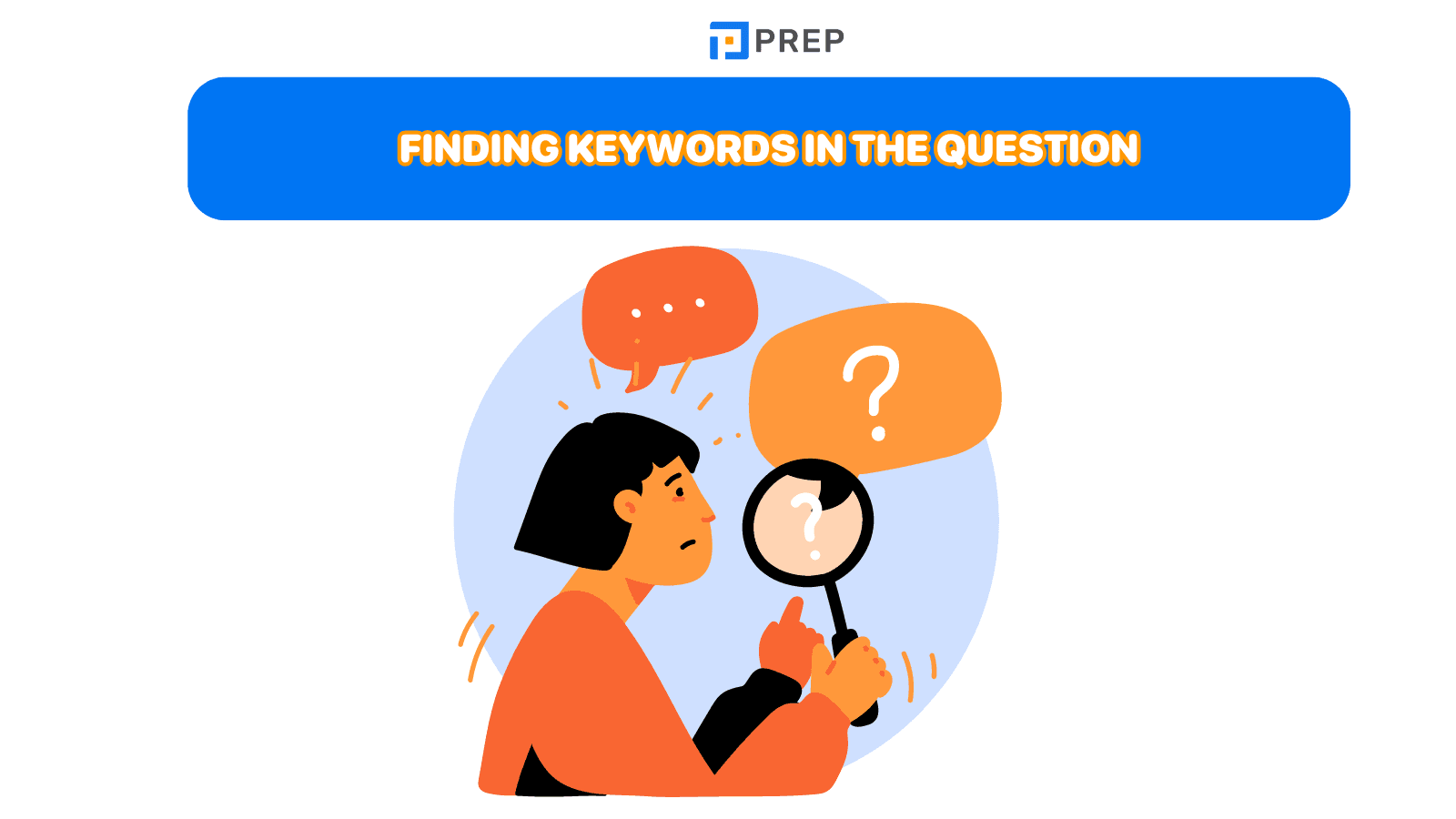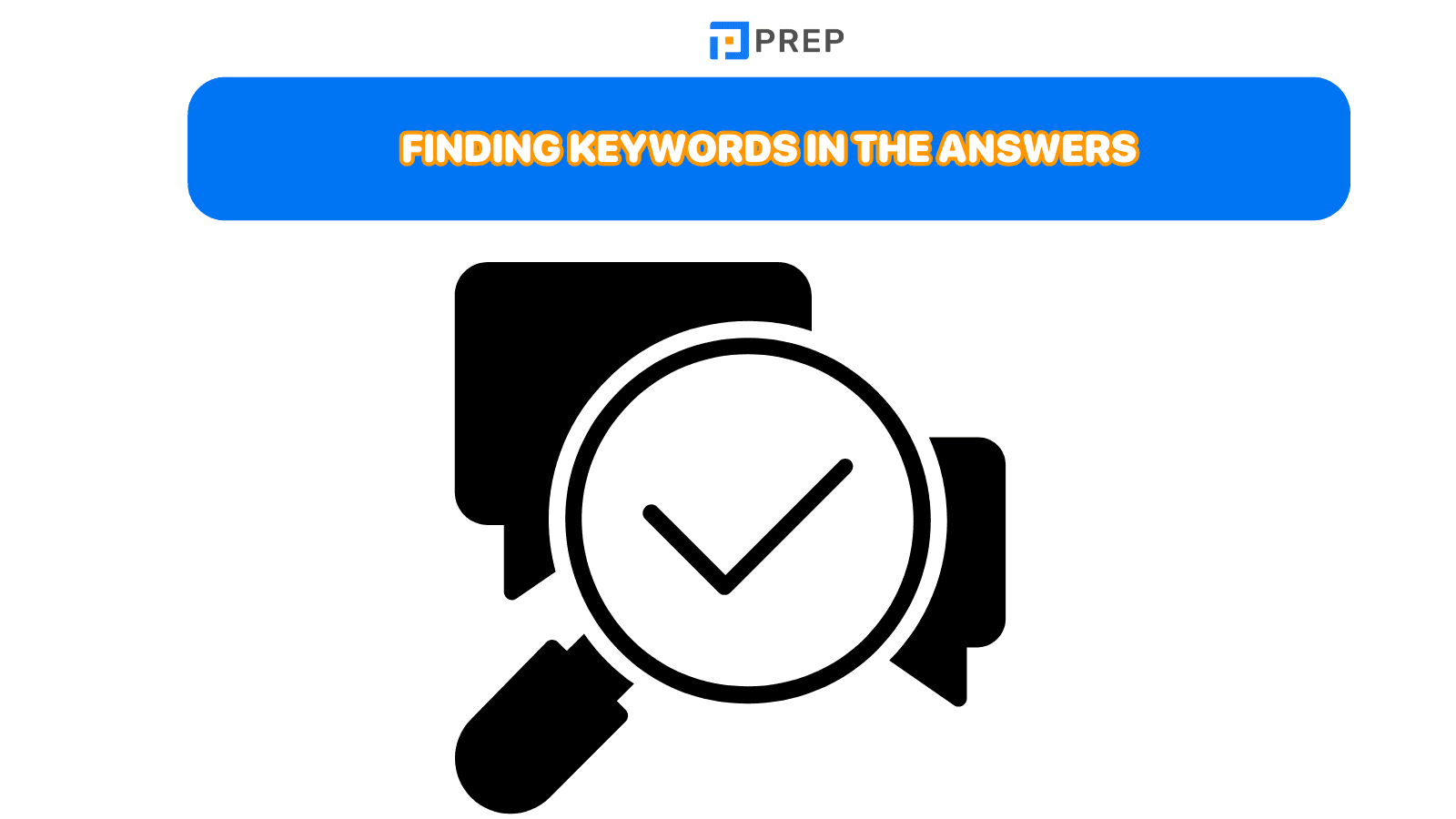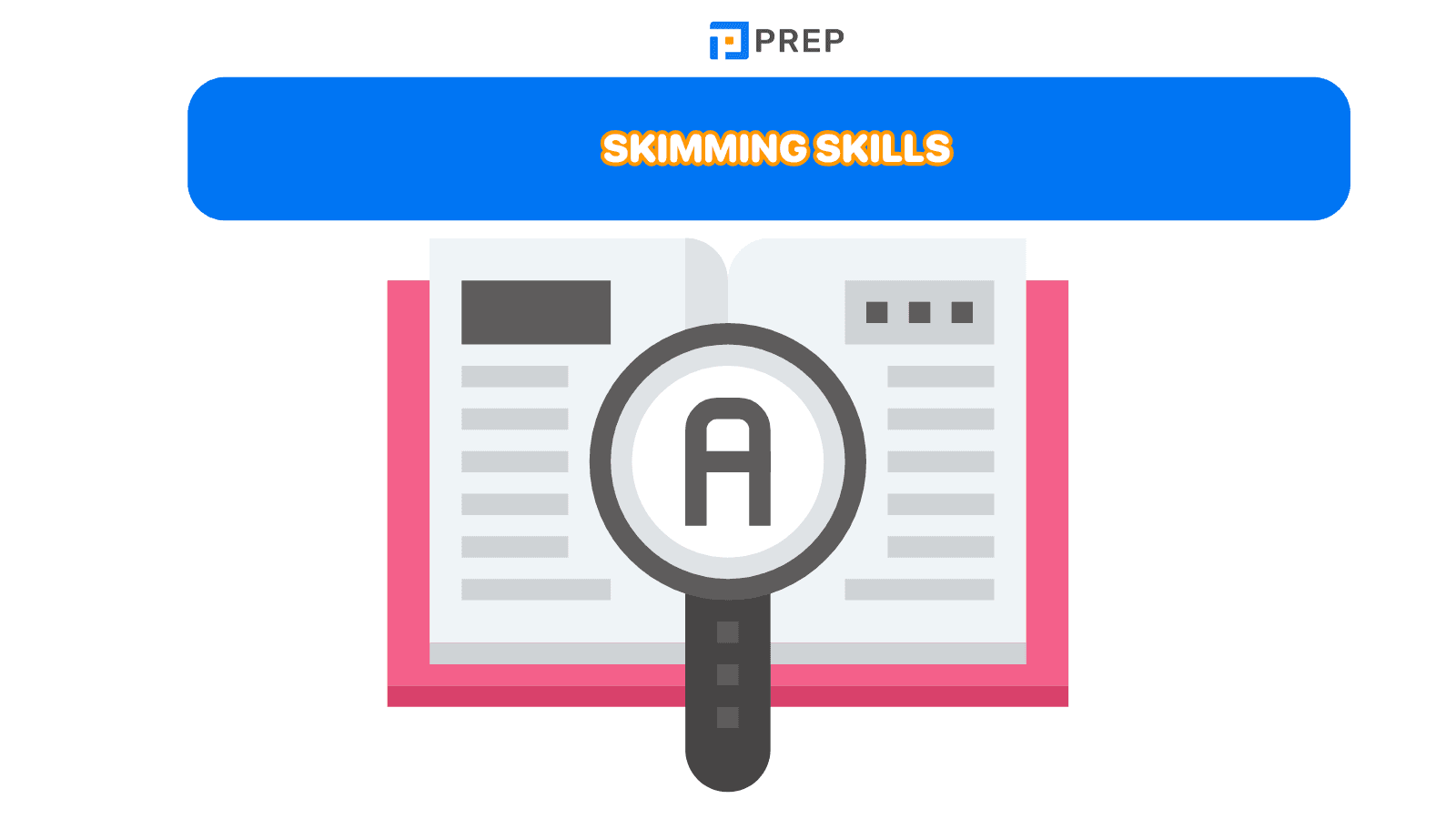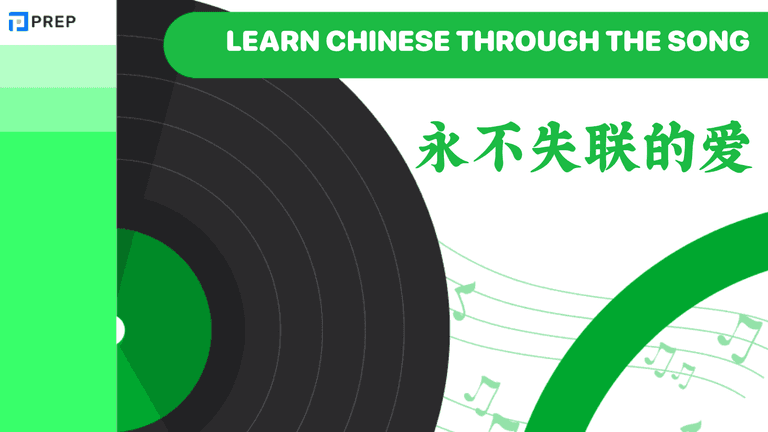How to Identify Keywords in IELTS Listening Easily
Understanding and identifying keywords is the key to success in IELTS Listening. This guide explains what keywords are, why they matter, and how to spot them in each section of the test. Get practical tips, common keyword types, and strategies to improve your listening accuracy.

I. Why Are Keywords Important in IELTS Listening?
In the IELTS Listening test, identifying and focusing on keywords is a critical skill that can significantly influence your overall score. Keywords are the essential words or phrases in a question that help you understand what to listen for in the audio. They guide your attention, shape your expectations, and act as mental signposts throughout the listening task.
Understanding keywords is not just about spotting individual words. More importantly, it’s about recognizing the core idea or focus behind each question so that you can anticipate the type of information or vocabulary that will appear in the recording. This process enhances both your speed and accuracy during the exam.
-
They help you stay oriented during fast-paced audio recordings by anchoring your attention to relevant sections.
-
Keywords enable better time management by allowing you to predict answers before the speaker mentions them.
-
They reduce the risk of being distracted by irrelevant details or traps (especially in Parts 3 and 4 of the test).
-
Recognizing synonyms or paraphrased forms of keywords improves your ability to follow the meaning, even if exact words aren’t repeated.
II. Common Types of Keywords You Should Focus On
Not all words in an IELTS Listening question carry equal importance. Some serve as functional elements, while others are your primary clues for identifying the correct information in the audio. By learning which types of keywords to prioritize, you can improve your ability to focus, anticipate answers, and avoid being misled.
Keywords by Test Section (Part 1–4)
Each part of the IELTS Listening test focuses on different contexts and uses distinct types of language. As a result, the types of keywords to look out for vary from one section to another:
-
Part 1 (Everyday Conversations): Pay attention to practical information such as names, addresses, dates, numbers, prices, phone numbers, and times. These are often tested as short answer or form-completion questions.
-
Part 2 (Monologue About Daily Topics): Listen for location words, directions, services, or facilities. Keywords often include nouns related to public places or descriptive adjectives.
-
Part 3 (Academic Discussions): Expect more complex vocabulary. Keywords may include academic terms, course names, opinions, or positions taken by different speakers.
-
Part 4 (Academic Lecture): Focus on technical terminology, topic headings, and logical connectors (e.g. "however", "therefore"). These help you follow the speaker’s line of argument and catch relevant facts.
For a breakdown of question types and what keywords to prioritise in each part, see IELTS listening question types.
Grammatical Forms Often Used as Keywords
Alongside the context of each section, recognizing the grammatical category of a keyword is equally important. Certain word types tend to carry more meaning and are therefore more useful to identify:
-
Nouns: Especially proper names, subjects, locations, and technical terms. These often signal what the speaker is focusing on.
-
Numbers & Dates: Always listen carefully for numerals, times, phone numbers, or measurements as they are commonly tested.
-
Adjectives & Descriptors: These give clues about qualities, opinions, or comparisons relevant in Parts 2 and 4.
-
Prepositions & Directions: Especially in map or diagram tasks, prepositions like “next to”, “opposite”, or “across from” are essential.
-
Verbs of Action or Requirement: Words like “you must”, “it’s necessary to”, or “make sure” often signal instruction-based answers.
By systematically training yourself to spot these types of keywords during the pre-listening phase, you’ll significantly increase the chances of locating the correct information during real-time listening.
III. How to Identify Keywords in IELTS Listening Questions
Being able to quickly identify keywords in the IELTS Listening test is a vital pre-listening skill. Since you only have a short time (around 30 seconds) to look at the questions before the recording begins, knowing what to underline and how to predict the type of answer can make a significant difference in your final score.
Here’s a simple yet effective 3-step strategy to help you identify keywords accurately and use them to guide your listening.
Step 1 – Underline the Key Information in Each Question
As soon as you are given time to look at the questions, scan through them and underline the most important words. These are typically:
-
Nouns (names, places, objects)
-
Action verbs (what is happening?)
-
Adjectives or qualifiers (e.g. “main reason”, “cheapest option”)
-
Time expressions (dates, hours, or stages)
Avoid wasting time underlining auxiliary verbs, prepositions, or articles unless they are clearly part of what's being tested (e.g. in maps or diagrams).
Example: Question – "What is the most important reason the company changed its schedule?"
Underline: “most important reason”, “company”, “changed”, “schedule”

Step 2 – Predict the Type of Answer You’re Listening For
After identifying the keywords, take a moment to ask yourself:
-
Will the answer likely be a number, name, location, or action?
-
Is the speaker going to compare options, describe a process, or state an opinion?
This prediction helps you mentally prepare for what is coming and filters out unnecessary information.
Example: If a question asks “What time does the museum open on Sundays?”, you should listen specifically for numbers and time phrases, not descriptions.

Step 3 – Pay Attention to Synonyms and Paraphrased Expressions
In the actual audio, the words you underline may not appear exactly as written in the question. IELTS commonly uses synonyms, paraphrases, or even restructured sentences. Training yourself to recognize alternate ways of expressing the same idea is crucial.
Examples of paraphrasing to watch for:
-
“Buy” → “Purchase”
-
“Start” → “Commence”
-
“Expensive” → “High-cost” or “Pricey”
To prepare, try reviewing past IELTS Listening tests and comparing the wording of the questions to the actual audio transcripts. This habit trains your brain to recognize meaning even when vocabulary changes.
For drills that train prediction skills, see predicting IELTS listening answers.
IV. Practice Methods: Improving Keyword Listening Skills
Identifying keywords effectively in IELTS Listening is not just about knowing what to underline—it requires consistent and focused practice. The following methods will help you train your brain to detect key information automatically, improve your concentration, and sharpen your ability to predict answers under exam pressure.
Skimming and Scanning Skills Before Listening
Before the audio begins in each section, you have around 30 seconds to read the questions. This is where skimming (reading quickly to get the general idea) and scanning (looking for specific words and structures) become essential.
How to practice:
-
Use IELTS sample questions to time yourself: 30 seconds/question block.
-
Practice highlighting content words (nouns, verbs, adjectives) and skipping function words (articles, prepositions).
-
Create your own version of “mini-speed reading drills” using past papers or transcripts.
By mastering these two reading strategies, you’ll improve both your efficiency and accuracy when selecting which words to focus on while listening.

Annotating and Mapping Keywords on Practice Papers
One of the most practical ways to reinforce your listening skills is to physically interact with the question sheets during your practice sessions. Annotation can help you stay mentally engaged and train your retention of key details.
Practical steps:
-
Print several past paper listening sections or use PDF versions with annotation tools.
-
Highlight or underline the most likely keywords and add small notes (e.g. “verb”, “date?”, “expect number”).
-
After completing the listening, compare your predicted keywords with the actual phrases used in the audio.
Doing this repeatedly also boosts your ability to recognize common paraphrasing techniques used in the test.
For note-taking systems and quick-mapping templates, see taking notes in IELTS listening.
Focused Listening with Transcript Comparison
Listening to the same audio twice—first without the script and then with the script—helps you track how keywords are delivered naturally and which ones are paraphrased.
How to do it:
-
Choose a Listening practice test with transcripts (Cambridge IELTS books are ideal).
-
First attempt: Do the section normally, mark your answers.
-
Second attempt: Re-listen while reading the transcript, highlight where the keywords were actually mentioned – note any synonyms or rephrased structures.
-
Final step: Analyze which keywords you missed and why.
This method improves active listening and forces you to bridge the gap between written and spoken English.
-
For guided dictation sets you can follow, see listening practice through dictation book.
Above is all the knowledge about how to find keywords in IELTS Listening. Hopefully, the knowledge shared by PREP will help you effectively prepare for the English exam at home and achieve a high band score in IELTS Listening. Additionally, if you want to learn more about Listening skills in the IELTS exam, feel free to check out the IELTS Listening course in the IELTS Basic Plus package.
If you have any further questions, please leave a comment below or contact PREP directly for the most detailed advice. Remember to practice regularly and apply these strategies during your preparation to improve your listening skills and achieve a high band score in the IELTS exam. Good luck!

Hi I'm Chloe, and I am currently serving as an Product Content Administrator at Prep Education. With over five years of experience in independent online IELTS study and exam preparation, I am confident in my ability to support learners in achieving their highest possible scores.
Comment
Premium content
View allPersonalized roadmap
Most read












